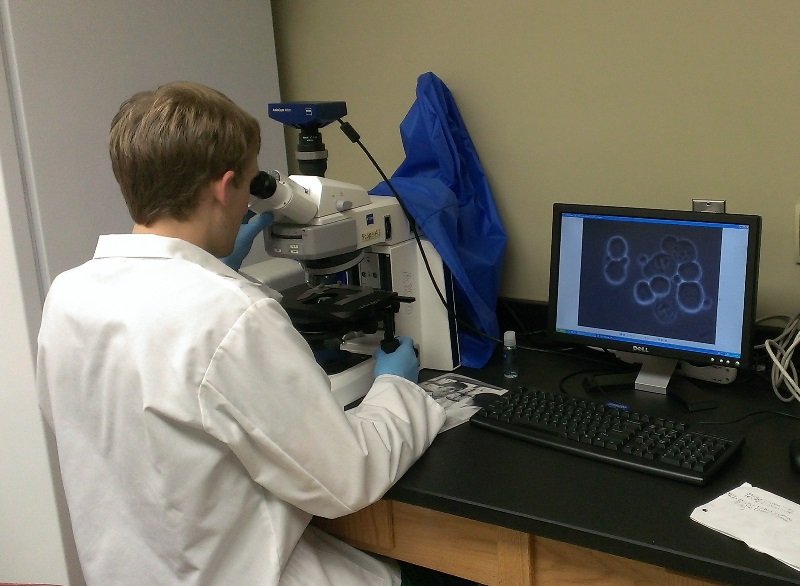
Curriculum > Cell & Molecular Biology
Cell and Molecular Biology
 We are pleased to offer a major in Cell and Molecular Biology. With the impact of biotechnology and molecular biology on many areas of health care, including medicine, pharmacy (particularly through the area of pharmacogenomics), dentistry, optometry, and veterinary medicine, this major provides a great background for students interested in these fields. Students may also be interested in pursuing graduate studies in Cell and Molecular Biology, following in the footsteps of recent Union alums Hunter Steppe (Georgetown University), Hannah Henson and Brandon Lowe (University of Tennessee Health Sciences Center in Memphis), who are pursuing PhD degrees. Because of our interest in integrating faith and science, students also have the opportunity to discuss the ethical impacts of these cutting edge advances with Union faculty and staff. New courses available as part of this major include Special Topics in Cell and Molecular Biology, taught with a different emphasis each time, including Cancer Biology, Signal Transduction, Cell-Cell communication and others, as well as Medical Parasitology. Students take important Chemistry courses as well, and this major does not require a minor.
We are pleased to offer a major in Cell and Molecular Biology. With the impact of biotechnology and molecular biology on many areas of health care, including medicine, pharmacy (particularly through the area of pharmacogenomics), dentistry, optometry, and veterinary medicine, this major provides a great background for students interested in these fields. Students may also be interested in pursuing graduate studies in Cell and Molecular Biology, following in the footsteps of recent Union alums Hunter Steppe (Georgetown University), Hannah Henson and Brandon Lowe (University of Tennessee Health Sciences Center in Memphis), who are pursuing PhD degrees. Because of our interest in integrating faith and science, students also have the opportunity to discuss the ethical impacts of these cutting edge advances with Union faculty and staff. New courses available as part of this major include Special Topics in Cell and Molecular Biology, taught with a different emphasis each time, including Cancer Biology, Signal Transduction, Cell-Cell communication and others, as well as Medical Parasitology. Students take important Chemistry courses as well, and this major does not require a minor.
What can you do with a Cell and Molecular Biology degree?
- Physician
- Pharmacist
- Teacher
- Biomedical Engineer
- Veterinarian
- Medical Missionary
- Pharmaceutical Representative
- Cell Biologist
- Botanist
- Biotechnologist
- Research Assistant
- Dentist
- Pharmacologist
- Dietitian
- Toxicologist
- Nuclear Medicine
- Epidemiologist
- Optometrist
- Horticulturist
- Cancer Researcher
- Genetic Counselor
Major in Cell and Molecular Biology
A. Independent Research Option - 72-73 hours
- BIO 112, 211; 210 or 215—12 hours
- BIO 315, 323, 325, 397—15 hours
- Three of BIO 307, 309, 310, 316, 317, 320, 321, or 324—12 hours
- One 300-level BIO Elective—3 or 4 hours
- CHE 111, 112, 314, 315, 324, 326, 319, 329—26 hours
- BIO 425, 426, 437, 498—4 hours
- No minor is required
B. Collaborative Research Option - 75-76 hours
- BIO 112, 211; 210 or 215—12 hours
- BIO 315, 323, 325, 397—15 hours
- Three of BIO 307, 309, 310, 316, 317, 320, 321, or 324—12 hours
- One 300-level BIO Elective—3 or 4 hours
- CHE 111, 112, 314, 315, 324, 326, 319, 329—26 hours
- BIO 304, 415, 498—7 hours
- No minor is required
Featured Coursework
- BIO 211 Microbiology
- BIO 307 Advanced Anatomy and Physiology I
- BIO 309 Advanced Anatomy and Physiology II
- BIO 310 Histology
- BIO 315 Genetics
- BIO 316 Physiology
- BIO 317 Developmental Biology
- BIO 320 Immunology
- BIO 321 Ecotoxicology
- BIO 323 Cell Biology
- BIO 324 Medical Parasitology
- BIO 325 Molecular Biology
- BIO 397 Special Studies in Cell and Molecular Biology
connect with us